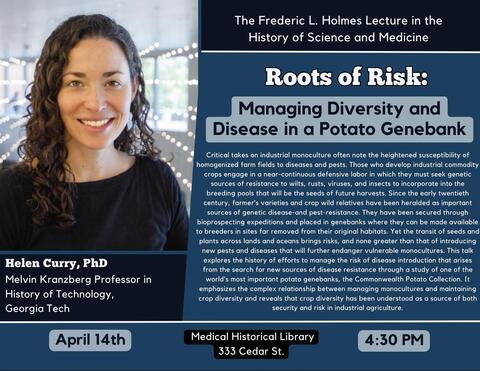Event time:
Monday, April 14, 2025 - 4:30pm
Location:
Medical Historical Library (333 Cedar Street)
Event description:
Critical takes on industrial monoculture often note the heightened susceptibility of homogenized farm fields to diseases and pests. Those who develop industrial commodity crops engage in a near-continuous defensive labor in which they must seek genetic sources of resistance to wilts, rusts, viruses, and insects to incorporate into the breeding pools that will be the seeds of future harvests. Since the early twentieth century, farmer’s varieties and crop wild relatives have been heralded as important sources of genetic disease- and pest-resistance. They have been secured through bioprospecting expeditions and placed in genebanks where they can be made available to breeders in sites far removed from their original habitats. Yet the transit of seeds and plants across lands and oceans brings risks, and none greater than that of introducing new pests and diseases that will further endanger vulnerable monocultures. This talk explores the history of efforts to manage the risk of disease introduction that arises from the search for new sources of disease resistance through a study of one of the world’s most important potato genebanks, the Commonwealth Potato Collection. It emphasizes the complex relationship between managing monocultures and maintaining crop diversity and reveals that crop diversity has been understood as a source of both security and risk in industrial agriculture.
Helen Curry is the Melvin Kranzberg Professor in History of Technology in the School of History and Sociology at Georgia Tech, where she researches and teaches the history of recent science and technology, especially as it relates to food and agriculture.
